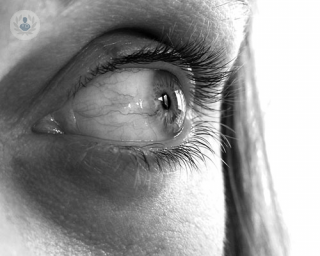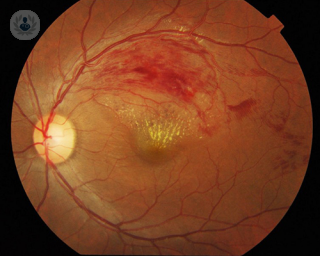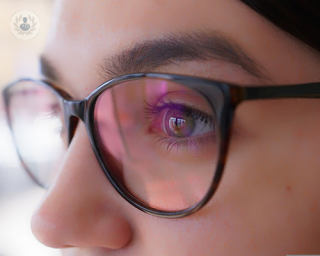What is macular oedema?
Macular oedema is an eye disease that causes fluid to build up in the macula, the part of the eye that provides clear, sharp vision. As this is a very sensitive and important area of the eye, when this accumulation of fluid occurs, vision is lost and objects are observed in a distorted way. It may also affect only certain parts of the eye or the entire macular. It is a pathology associated with diabetic patients, as it is one of the main visual problems they suffer from.

Prognosis of macular oedema:
The prognosis is very variable in each situation, and in all cases it is advisable to consult an ophthalmologist specialising in retinas to make an accurate diagnosis and the most convenient treatment.
Symptoms of macular oedema:
The symptoms of macular oedema affect central vision, causing:
- Blurred vision
- Distortion of lines
If it is not treated properly, the patient may have very limited central vision.
Medical tests for macular oedema:
The most common method of diagnosing whether or not a patient has macular oedema is a stereoscopic clinical examination with a biomicroscope or slit lamp. Sometimes, however, it is necessary to use additional imaging tests:
- Optical coherence tomography (OCT)
- Fluorescein angiography
What causes macular oedema?
There are many causes that can lead to macular oedema, but it is often associated with diabetes.
Also, eye surgery may increase the risk of developing macular oedema due to irritation of the blood vessels that may allow fluid to leak out. A macular oedema that develops after cataract surgery is called cystic macular oedema (CME).
Other causes of macular oedema include:
- Age-related macular degeneration
- Uveitis
- Blockage in the small veins of the retina
- Injuries to the eye
- Side effects of certain medications
- Some eye tumours
- Certain genetic disorders, such as a form of macular dystrophy
Can macular oedema be prevented?
Good control of predisposing factors, such as diabetes or high blood pressure is essential.
Treatments for macular oedema
Treatment of macular oedema will depend on the cause and the degree of progression. The following are possible treatments for macular oedema:
- Drug treatment with eye drops, or intraocular and periocular injections, aimed at sealing fluid leaks from the macula.
- Laser photocoagulation of the points in the blood vessels where the loss of fluid that accumulates in the macula alters its function.
- Vitrectomy surgery : this treatment is used in the most severe cases.
Which specialist treats macular oedema?
Ophthalmologists are responsible for preventing, diagnosing and treating diseases that affect the patient's eyes and visual capacity, such as macular degeneration.
03-14-2017 03-29-2023Macular oedema
Mr Praveen Patel - Ophthalmology
Created on: 03-14-2017
Updated on: 03-29-2023
Edited by: Jay Staniland
What is macular oedema?
Macular oedema is an eye disease that causes fluid to build up in the macula, the part of the eye that provides clear, sharp vision. As this is a very sensitive and important area of the eye, when this accumulation of fluid occurs, vision is lost and objects are observed in a distorted way. It may also affect only certain parts of the eye or the entire macular. It is a pathology associated with diabetic patients, as it is one of the main visual problems they suffer from.

Prognosis of macular oedema:
The prognosis is very variable in each situation, and in all cases it is advisable to consult an ophthalmologist specialising in retinas to make an accurate diagnosis and the most convenient treatment.
Symptoms of macular oedema:
The symptoms of macular oedema affect central vision, causing:
- Blurred vision
- Distortion of lines
If it is not treated properly, the patient may have very limited central vision.
Medical tests for macular oedema:
The most common method of diagnosing whether or not a patient has macular oedema is a stereoscopic clinical examination with a biomicroscope or slit lamp. Sometimes, however, it is necessary to use additional imaging tests:
- Optical coherence tomography (OCT)
- Fluorescein angiography
What causes macular oedema?
There are many causes that can lead to macular oedema, but it is often associated with diabetes.
Also, eye surgery may increase the risk of developing macular oedema due to irritation of the blood vessels that may allow fluid to leak out. A macular oedema that develops after cataract surgery is called cystic macular oedema (CME).
Other causes of macular oedema include:
- Age-related macular degeneration
- Uveitis
- Blockage in the small veins of the retina
- Injuries to the eye
- Side effects of certain medications
- Some eye tumours
- Certain genetic disorders, such as a form of macular dystrophy
Can macular oedema be prevented?
Good control of predisposing factors, such as diabetes or high blood pressure is essential.
Treatments for macular oedema
Treatment of macular oedema will depend on the cause and the degree of progression. The following are possible treatments for macular oedema:
- Drug treatment with eye drops, or intraocular and periocular injections, aimed at sealing fluid leaks from the macula.
- Laser photocoagulation of the points in the blood vessels where the loss of fluid that accumulates in the macula alters its function.
- Vitrectomy surgery : this treatment is used in the most severe cases.
Which specialist treats macular oedema?
Ophthalmologists are responsible for preventing, diagnosing and treating diseases that affect the patient's eyes and visual capacity, such as macular degeneration.


Blurred lines – a guide to macular oedema
By Mr Praveen Patel
2024-12-14
Macular oedema is one condition that can distort how we see, but what is it and how does it occur? Top London ophthalmologist Mr Praveen Patel has the answers. See more


What is retinal vein occlusion?
By Mr Praveen Patel
2024-12-14
RVO is one of the most common causes of sudden painless loss of vision. Expert ophthalmologist Mr Praveen Patel gives us the facts about retinal vein occlusion. See more


Macular hole: your questions answered
By Mr Craig Goldsmith
2024-12-13
A macular hole is an eye condition that can cause blindness if left untreated. In our latest article, renowned ophthalmologist Mr Craig Goldsmith answers the most frequently asked questions regarding this condition. See more
Experts in Macular oedema
-
Mr Praveen Patel
OphthalmologyExpert in:
- Macular degeneration (AMD)
- Retina
- Retinal vein occlusion
- Diabetic retinopathy
- Macular oedema
- Intravitreal injection
-
Dr Rupal Morjaria
OphthalmologyExpert in:
- Macular oedema
- Intravitreal injection
- YAG laser capsulotomy
- Cataract surgery
- Macular degeneration (AMD)
- Diabetic retinopathy
-
Dr Meg Das
OphthalmologyExpert in:
- Diabetic retinopathy
- Macular degeneration (AMD)
- Retinal vein occlusion
- Macular oedema
-
Mr Luke Nicholson
OphthalmologyExpert in:
- Retinal vein occlusion
- Macular degeneration (AMD)
- Macular oedema
- Diabetic retinopathy
- Cataracts
- Cataract surgery
-
Mrs Patel Gordon-Bennett
OphthalmologyExpert in:
- Cataract surgery
- Macular hole
- Vitrectomy
- Eye floaters
- Epiretinal membrane
- Macular oedema
- See all

Spire Little Aston Hospital
Spire Little Aston Hospital
Little Aston Hall Drive, Sutton Coldfield, B74 3UP
No existe teléfono en el centro.
By using the telephone number provided by TOP DOCTORS, you automatically agree to let us use your phone number for statistical and commercial purposes. For further information, read our Privacy Policy
Top Doctors

Eye Surgery Scotland
Eye Surgery Scotland
40 Colinton Road, EH10 5BT
No existe teléfono en el centro.
By using the telephone number provided by TOP DOCTORS, you automatically agree to let us use your phone number for statistical and commercial purposes. For further information, read our Privacy Policy
Top Doctors

London Medical
London Medical
49 Marylebone High Street, W1U 5HJ
No existe teléfono en el centro.
By using the telephone number provided by TOP DOCTORS, you automatically agree to let us use your phone number for statistical and commercial purposes. For further information, read our Privacy Policy
Top Doctors
-
Spire Little Aston Hospital
Little Aston Hall Drive, Sutton Coldfield, B74 3UP, Sutton ColdfieldExpert in:
- Bariatric Surgery
- General Surgery
- Orthopaedic surgery
- Robotic Surgery
- Diagnostic Imaging
- Ophthalmology
-
Eye Surgery Scotland
40 Colinton Road, EH10 5BT, EdinburghExpert in:
- Cataracts
- Retina and Vitreous
- Lens replacement
-
London Medical
49 Marylebone High Street, W1U 5HJ, Central LondonExpert in:
- Cardiology
- Adult Diabetes
- Child Diabetes
- Endocrinology
- General practice
- Ophthalmology
- See all
- Most viewed diseases, medical tests, and treatments
- Visual impairment
- Diabetic retinopathy
- Retina
- Presbyopia
- Nystagmus
- Myopia
- Hyperopia (farsightedness)
- Eye examination
- Blepharitis
- Astigmatism







